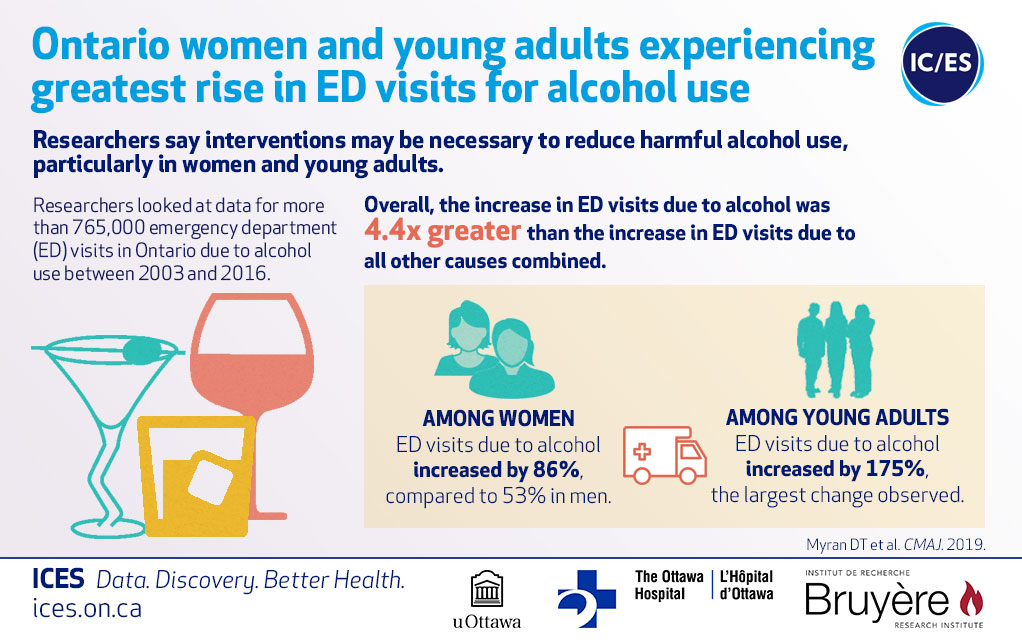 “We found that ED visits due to alcohol use are rapidly increasing in Ontario,” says Dr. Daniel Myran. “These increases are consistent with data showing increasing average weekly alcohol consumption in Ontario and higher rates of binge drinking during the study period, particularly in women across Canada.”More Ontarians are ending up in emergency departments (ED) due to alcohol use, with the largest increases happening in women, and young adults between the ages of 25 and 29, according to a new study led by researchers at ICES, The Ottawa Hospital, the Bruyère Research Institute and the University of Ottawa.
“We found that ED visits due to alcohol use are rapidly increasing in Ontario,” says Dr. Daniel Myran. “These increases are consistent with data showing increasing average weekly alcohol consumption in Ontario and higher rates of binge drinking during the study period, particularly in women across Canada.”More Ontarians are ending up in emergency departments (ED) due to alcohol use, with the largest increases happening in women, and young adults between the ages of 25 and 29, according to a new study led by researchers at ICES, The Ottawa Hospital, the Bruyère Research Institute and the University of Ottawa.
The study published today in the CMAJ identified a total of 765,354 ED visits in Ontario due to alcohol use over a 14-year study period (2003-2016). These visits represented 1.2 per cent of all ED visits in Ontario. The number of ED visits due to alcohol increased on average by 6.7 per cent (2676 visits) per year over the study period. After adjusting for the aging and growing population, the researchers found that ED visits due to alcohol increased by 86 per cent in women (from 20.7 visits to 38.6 visits per 10,000 individuals) and 53 per cent in men (from 51.1 to 78.3 visits per 10,000 individuals). By comparison, while ED visits due to any cause also increased over the study period, the observed increase in ED visits due to alcohol was 4.4 times greater.
“We found that ED visits due to alcohol use are rapidly increasing in Ontario,” says lead author Dr. Daniel Myran, a family physician and public health and preventive medicine resident at the University of Ottawa, who is also training at The Ottawa Hospital and Bruyère Research Institute. “These increases are consistent with data showing increasing average weekly alcohol consumption in Ontario and higher rates of binge drinking during the study period, particularly in women across Canada.”
Alcohol use causes a large burden on the health of Canadians, leading to an estimated 5.8 per cent of deaths in men and 0.6 per cent of deaths in women in 2017.
During the study period, the age group that had the largest increase in alcohol-related ED visits was young adults aged 25 to 29, with a 175 per cent increase (27.2 visits per 10,000 individuals to 74.9 visits per 10,000).
“Our findings show a concerning generational effect, where youth and young adults are experiencing year-over-year increases in alcohol-related harms over the last decade and a half,” says senior author Dr. Peter Tanuseputro, adjunct scientist at ICES, researcher at the Bruyère Research Institute, physician-scientist at The Ottawa Hospital and assistant professor at the University of Ottawa.
Other findings include:
 “Our findings show a concerning generational effect, where youth and young adults are experiencing year-over-year increases in alcohol-related harms over the last decade and a half,” says senior author Dr. Peter Tanuseputro.ED visits for alcohol use at age 19 years increased on average by 4.1 per cent every year.
“Our findings show a concerning generational effect, where youth and young adults are experiencing year-over-year increases in alcohol-related harms over the last decade and a half,” says senior author Dr. Peter Tanuseputro.ED visits for alcohol use at age 19 years increased on average by 4.1 per cent every year.
- Women who visited the ED due to alcohol were more likely to be under the legal drinking age of 19 years (17 per cent) compared with men (9 per cent).
- The highest rates of alcohol-related visits were in women aged 15 to 24 and men aged 45 to 54.
Although individuals in the lowest neighbourhood income group had 2.4 times the rate of ED visits due to alcohol than those in the highest income group, this relation was relatively stable over the study period.
Author block: Myran DT, Hsu AT, Smith G, Tanuseputro P.
The study “Rates of emergency department visits attributable to alcohol use in Ontario from 2003 to 2016: a retrospective population-level study,” is published in the July 22 issue of CMAJ.

About ICES
ICES is an independent, non-profit research institute that uses population-based health information to produce knowledge on a broad range of health care issues. Our unbiased evidence provides measures of health system performance, a clearer understanding of the shifting health care needs of Ontarians, and a stimulus for discussion of practical solutions to optimize scarce resources. ICES knowledge is highly regarded in Canada and abroad, and is widely used by government, hospitals, planners, and practitioners to make decisions about care delivery and to develop policy. In October 2018, the institute formerly known as the Institute for Clinical Evaluative Sciences formally adopted the initialism ICES as its official name. For the latest ICES news, follow us on Twitter: @ICESOntario
About The Ottawa Hospital: Inspired by research. Driven by compassion.
The Ottawa Hospital is one of Canada’s largest learning and research hospitals with over 1,100 beds, approximately 12,000 staff and an annual budget of over $1.2 billion. Our focus on research and learning helps us develop new and innovative ways to treat patients and improve care. As a multi-campus hospital, affiliated with the University of Ottawa, we deliver specialized care to the Eastern Ontario region, but our techniques and research discoveries are adopted around the world. We engage the community at all levels to support our vision for better patient care. See www.ohri.ca for more information about research at The Ottawa Hospital.
About the University of Ottawa: —A crossroads of cultures and ideas
The University of Ottawa is home to over 50,000 students, faculty and staff, who live, work and study in both French and English. Our campus is a crossroads of cultures and ideas, where bold minds come together to inspire game-changing ideas. We are one of Canada’s top 10 research universities—our professors and researchers explore new approaches to today’s challenges. One of a handful of Canadian universities ranked among the top 200 in the world, we attract exceptional thinkers and welcome diverse perspectives from across the globe. www.uottawa.ca
About the Bruyère Research Institute
The Bruyère Research Institute supports investigators who contribute to a better, more responsive health care system that delivers the best care to patients, residents and families. The Institute is a proud partner of Bruyère Continuing Care, the University of Ottawa and others and provides solutions to improve the health and health care of aging and vulnerable Canadians. The Institute’s research focuses primarily on evidence, health system evaluation, brain health, geriatrics and rehabilitation, primary care, palliative care, and global health. www.bruyere.org/bri
Media Contacts
Deborah Creatura
Media Advisor, ICES
deborah.creatura@ices.on.ca
(o) 416-480-4780 or (c) 647-406-5996
Jenn Ganton
Director, Communications and Public Relations
Ottawa Hospital Research Institute
Cell: 613-614-5253
jganton@ohri.ca
(The Ottawa Hospital's media team will also take inquiries on July 22 at 613-737-8460)
